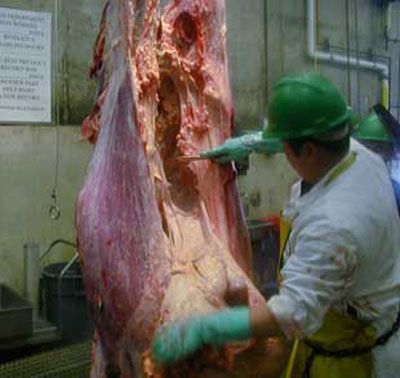(source)
This month, HBO premiered an original biopic starring Claire Danes about an extraordinary person, Dr. Temple Grandin. As a young woman, Grandin struggled with the isolating challenges of autism at a time when this disorder was almost a total mystery. Today she is one of the best known advocates for autism education.
But I applaud Dr. Grandin for another reason, one that has angered some people who work in animal protection: I admire her work in the field of humane animal slaughter. PETA would prefer, of course, that no animals be killed for food, but we won't ignore the horrors of factory farms and slaughterhouses just because we wish that they didn't exist.
Throughout her career as an animal-science professor at Colorado State University and a consultant to the American Meat Institute, Grandin has worked to improve animal-handling systems at slaughterhouses--markedly decreasing, although never able to stop completely, the amount of fear and pain that animals experience.
In 2006, she described to National Public Radio (NPR) her experience watching cattle get vaccinated at feedlots during the 1970s. Some of the animals would just walk into the holding chutes, she said, while others refused. So Grandin did what no one else had bothered to do before: She went into the chutes herself. As she wrote in an essay for my book One Can Make a Difference, "[I]t seemed obvious to me to get down into the chute and see what the cattle were seeing." She realized that visual details such as shadows, a reflection off a truck's bumper or people standing up ahead were causing the animals to be fearful.
These insights led her to design cattle-restraining systems that are now used by half the meat plants in North America. "[P]eople just wanted to get out there and yell and scream and push and shove," Grandin told NPR, rather than "remove the things that the cattle were afraid of."
This may seem like a small victory--the cows are still going to be killed after all--but until the day that we get animals off the dinner plate altogether, is it too much to ask that we do everything we can to reduce the fear and suffering that they experience in the slaughterhouse?
(Note: You can view every article as one long page if you sign up as an Advocate Member, or higher).





